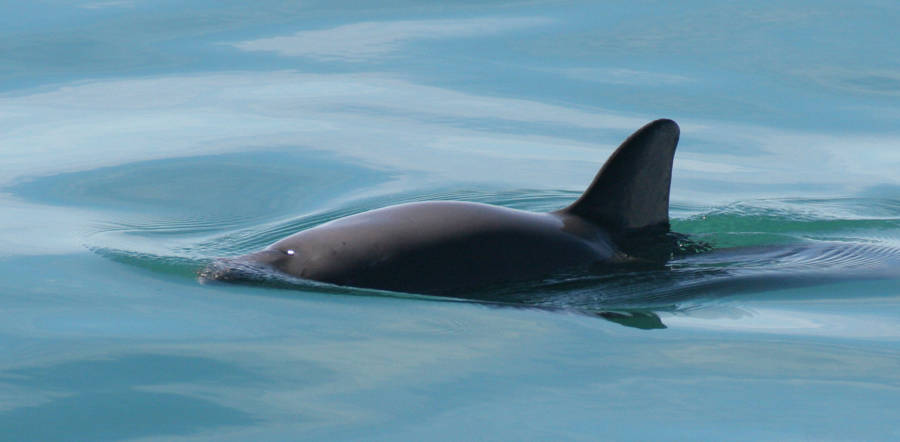Only 30 vaquita porpoises remain and there's no sure way to save them.

Wikimedia CommonsFew pictures of living vaquitas exist.
Very few people have ever glimpsed a vaquita, the world’s smallest porpoise.
Those who have seen the undeniably cute, snub-nosed creature are typically fishermen, who mistakenly pull their bloodied and shining bodies into the tangles of gillnets — preventing them from surfacing for air.
The 120-pound, four to five-foot-long porpoises are distinguished by dark patches around their eyes and mouths, which make them appear to always be smiling.
Despite this perpetual grin, an increased demand for fish, decreased water flow, and pesticide pollution in their Gulf of California habitat means that no more than 30 vaquitas remain on Earth.
The sharp decline is due, in part, to the poaching of another endangered fish in the area called the totoaba. Chinese diners will pay thousands of dollars to eat the creature’s dried swim bladder, believing it to have powerful health benefits.
Since 2011, people hunting for totoaba have killed 90 percent of the vaquita population, according to a team from Mexico’s National Ecology and Climate Change Institute (INECC).
Environmentalists have tried nearly everything to keep the species from extinction — even enlisting the Mexican Navy to help — all to no avail.
Now in the final hour, there seems to be only one more solution left to try. Experts have suggested capturing several of the remaining vaquita and holding them in a sea pen until threats have been mitigated.
“We had always been opposed to captivity,” Lorenzo Rojas Bracho from the INECC told The New York Times.
This is due, in part, to ethical concerns. But also because it would be an extremely complicated undertaking.
United States Navy dolphins would have to be trained to locate several of the remaining vaquitas, which would then need to be safely caught and transferred to a temporary pool while a protected sea pen is constructed off the Mexican coast.
“We don’t know whether they find them,” Barbara Taylor, a marine mammal expert, told the Times of the dolphins. “We don’t know whether we can catch them. We don’t know how they will react.”
So even if the plan is put into place, the situation looks dire.
Most of the population would remain in the wild, where expensive conservation efforts by the Mexican government have done little to deter fishers from using the deadly gillnets or poachers from traversing the shallow waters.
One campaign from the Sea Shepherd Conservation Society called Operation Milagro (Operation Miracle), patrols the vaquita habitat in a 57-meter anti-poaching vessel. Even with the strict laws, they reportedly see illegal activity every single day.
Supervised breeding in captivity would not negate the declining numbers, since female vaquitas only give birth to one calf every two years.
“It requires intensive sustained efforts for decades to recover species from these catastrophic low levels,” Richard Young, the head of conservation science at the Durrell Wildlife Conservation Trust, told the Times.
Whatever techniques are used in this particular endeavor will likely have consequences extending beyond the vaquita. There are, after all, 16,306 species currently threatened with extinction, according to the International Union for Conservation of Nature.
The vaquita is only the latest in a long line of disappearing creatures, and certainly not the last.
After learning about the dire situation of vaquita porpoises, learn about how Harvard scientists plan to resurrect the Woolly Mammoth by 2019. Then check out the new technology taking aim at poachers.




